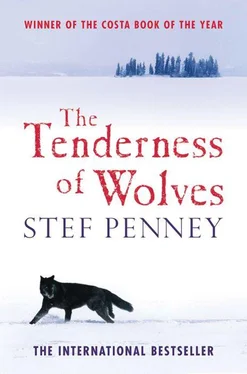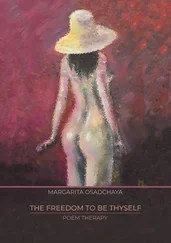Stef Penney
The Tenderness of Wolves
The last time I saw Laurent Jammet, he was in Scott’s store with a dead wolf over his shoulder. I had gone to get needles, and he had come in for the bounty. Scott insisted on the whole carcass, having once been bamboozled by a Yankee who brought in a pair of ears one day and claimed his bounty, then some time later brought in the paws for another dollar, and finally the tail. It was winter and the parts looked fairly fresh, but the con became common knowledge, to Scott’s disgust. So the wolf’s face was the first thing I saw when I walked in. The tongue lolled out of the mouth, which was pulled back in a grimace. I flinched, despite myself. Scott yelled and Jammet apologised profusely; it was impossible to be angry with him, what with his charm and his limp. The carcass was removed out back somewhere, and as I was browsing, they began to argue about the moth-eaten pelt that hangs over the door. I think Jammet suggested jokingly that Scott replace it with a new one. The sign under it reads, ‘Canis lupus (male), the first wolf to be caught in the Town of Caulfield, 11th February, 1860.’ The sign tells you a lot about John Scott, demonstrating his pretensions to learning, his self-importance and the craven respect for authority over truth. It certainly wasn’t the first wolf to be caught round here, and there is no such thing as the town of Caulfield, strictly speaking, although he would like there to be, because then there would be a Council, and he could be its Mayor.
‘Anyway, that is a female. Males have a darker collar, and are bigger. This one is very small.’
Jammet knew what he was talking about, as he had caught more wolves than anyone else I know. He smiled, to show he meant no offence, but Scott takes offence like it is going out of fashion, and bristled.
‘I suppose you remember better than I do, Mr Jammet?’
Jammet shrugged. Since he wasn’t here in 1860, and since he was French, unlike the rest of us, he had to watch his step.
At this point I stepped up to the counter. ‘I think it was a female, Mr Scott. The man who brought it in said her cubs howled all night. I remember it distinctly.’
And the way Scott strung up the carcass by its back legs outside the store for everyone to gawp at. I had never seen a wolf before, and I was surprised at its smallness. It hung with its nose pointing at the ground, eyes closed as if ashamed. Men mocked the carcass, and children laughed, daring each other to put their hands in its mouth. They posed with it for each other’s amusement.
Scott turned tiny, bright blue eyes on me, either affronted that I should side with a foreigner, or just affronted, it was hard to tell.
‘And look what happened to him.’ Doc Wade, the man who brought in the bounty, drowned the following spring–as though that threw his judgement into question.
‘Ah, well …’ Jammet shrugged and winked at me, the cheek.
Somehow–I think Scott mentioned it first–we got talking about those poor girls, as people usually do when the subject of wolves is raised. Although there are any number of unfortunate females in the world (plenty in my experience alone), around here ‘those poor girls’ always refers to only two–the Seton sisters, who vanished all those years ago. There was a few minutes’ pleasant and pointless exchange of views that broke off suddenly when the bell rang and Mrs Knox came in. We pretended to be very interested in the buttons on the counter. Laurent Jammet took his dollar, bowed to me and Mrs Knox, and left. The bell jangled on its metal spring for a long time after he walked out.
That was all, nothing significant about it. The last time I saw him.
Laurent Jammet was our closest neighbour. Despite this, his life was a mystery to us. I used to wonder how he hunted wolves with his bad leg, and then someone told me that he baited deer meat with strychnine. The skill came in following the trail to the resulting corpse. I don’t know though; that is not hunting as I see it. I know wolves have learnt to stay out of range of a Winchester rifle, so they cannot be entirely stupid, but they are not so clever that they have learnt to distrust a free gift of food, and where is the merit in following a doomed creature to its end? There were other unusual things about him: long trips away from home in parts unknown; visits from dark, taciturn strangers; and brief displays of startling generosity, in sharp counterpoint to his dilapidated cabin. We knew that he was from Quebec. We knew that he was Catholic, although he did not often go to church or to confession (though he may have indulged in both during his long absences). He was polite and cheerful, although he did not have particular friends, and kept a certain distance. And he was, I dare say, handsome, with almost-black hair and eyes, and features that gave the impression of having just finished smiling, or being just about to start. He treated all women with the same respectful charm, but managed not to irritate either them or their husbands. He was not married and showed no inclination to do so, but I have noticed that some men are happier on their own, especially if they are rather slovenly and irregular in their habits.
Some people attract an idle and entirely unmalicious envy. Jammet was one of those, lazy and good-natured, who seem to slide through life without toil or effort. I thought him lucky, because he did not seem to worry about those things that turn the rest of us grey. He had no grey hairs, but he had a past, which he kept mostly to himself. He imagined himself to have a future, too, I suppose, but he did not. He was perhaps forty. It was as old as he would ever get.
It is a Thursday morning in mid-November, about two weeks after that meeting in the store. I walk down the road from our house in a dreadful temper, planning my lecture carefully. More than likely I rehearse it aloud–one of many strange habits that are all too easy to pick up in the backwoods. The road–actually little more than a series of ruts worn by hooves and wheels–follows the river where it plunges down a series of shallow falls. Under the birches patches of moss gleam emerald in the sunlight. Fallen leaves, crystallised by the night’s frost, crackle under my feet, whispering of the coming winter. The sky is an achingly clear blue. I walk quickly in my anger, head high. It probably makes me look cheerful.
Jammet’s cabin sits away from the riverbank in a patch of weeds that passes for a garden. The unpeeled log walls have faded over the years until the whole thing looks grey and woolly, more like a living growth than a building. It is something from a bygone age: the door is buckskin stretched over a wooden frame, the windows glazed with oiled parchment. In winter he must freeze. It’s not a place where the women of Dove River often call, and I haven’t been here myself for months, but right now I have run out of places to look.
There is no smoke signal of life inside, but the door stands ajar; the buckskin stained from earthy hands. I call out, then knock on the wall. There is no reply, so I peer inside, and when my eyes have adjusted to the dimness I see Jammet, at home and, true to form, asleep on his bed at this time in the morning. I nearly walk away then, thinking there is no point waking him, but frustration makes me persevere. I haven’t come all this way for nothing.
‘Mr Jammet?’ I start off, sounding, to my mind, irritatingly bright. ‘Mr Jammet, I am sorry to disturb you but I must ask …’
Laurent Jammet sleeps peacefully. Round his neck is the red neckerchief he wears for hunting, so that other hunters will not mistake him for a bear and shoot him. One foot protrudes off the side of the bed, in a dirty sock. His red neckerchief is on the table … I have grasped the side of the door. Suddenly, from being normal, everything has changed completely: flies hover round their late autumn feast; the red neckerchief is not round his neck, it cannot be, because it is on the table, and that means …
Читать дальше












